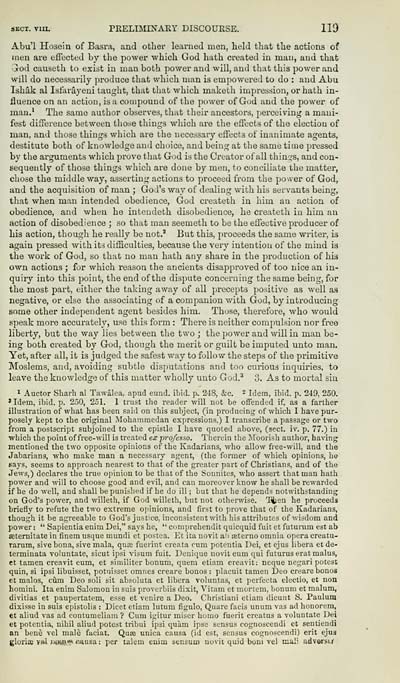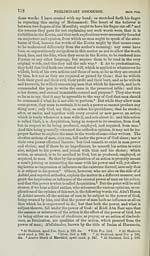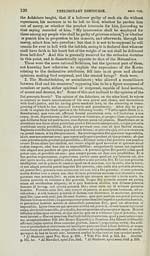Download files
Complete book:
Individual page:
Thumbnail gallery: Grid view | List view

aKCT. viu. PRELIMINARY DISCOURSE. 119
Abu'l Hosein of Basra, and otlier learned men, held that the actions of
men are effected by the power which God hath created in man, and that
jrod causeth to exist in man both power and will, and that this power and
will do necessarily produce that which man is empowered to do : and Abu
Ishak al Isfarayeni taught, that that which maketh impression, or hath in-
fluence on an action, is a compound of the power of God and the power of
man.^ The same author observes, that their ancestors, perceiving a mani-
fest difference between those things wliich are the effects of the election of
man, and those things which are the necessary effects of inanimate agents,
destitute both of knowledge and choice, and being at the same time pressed
by the arguments which prove that God is the Creator of all thinc^s, and con-
sequently of those things which are done by men, to conciliate the matter,
chose the middle way, asserting actions to proceed from the power of God,
and the acquisition of man ; God's way of dealing with his servants being,
that when man intended obedience, God createth in him an action of
obedience, and when he intendeth disobedience, he createth in him an
action of disobedience ; so that man seemeth to be the effective producer of
his action, though he really be not.' But this, proceeds the same writer, is
again pressed with its difficulties, because the very intention of the mind is
the work of God, so that no man hath any share in the production of his
own actions ; for which reason the ancients disapproved of too nice an in-
quiry into this point, the end of the dispute concerning the same being, for
the most part, either the taking away of all jjrecepts positive as well as
negative, or else the associating of a companion with God, by introducing
some other independent agent besides him. Those, thei'efore, who would
speak more accurately, use this form : Thei-e is neither compulsion nor free
liberty, but the way lies between the two ; the power and will in man be-
ing both created by God, though the merit or giiilt be imputed unto man.
Yet, after all, it is judged the safest way to follow the steps of the primitive
Moslems, and, avoiding subtle disputations and too curious inquiries, to
leave the knowledge of this matter wholly unto God.' 3. As to mortal sin
1 Auctor Sharh al Tawalca, apud eund. ibid. p. 248, &c. « Idem, ibid. p. 249, 250.
' Idem, ibid. p. 250, 251. 1 trust the reader will not be offended if, as a farther
illustration of what has been said on this subject, (in producing of which I have pur-
posely kept to the original Mohammedan expressions.) I transcribe a passage or two
from a postscript subjoined to the epistle I have quoted above, (sect. iv. p. 77.) in
which the point of free-will is treated ex pro/esso. Therein the Moorish author, having
mentioned the two opposite opinions of the Kadarians, who allow free-will, and the
Jabarians, who make man a necessaiy agent, (the former of which opinions, he
says, seems to approach nearest to that of the greater part of Christians, and of the
Jews,) declares the true opinion to be that of the Sonnites, who assert that man hath
power and will to choose good and evil, and can moreover know he shall be rewarded
if he do well, and shall be punished if he do ill ; but that he depends notwithstanding
on God's power, and willeth, if God willeth, but not otherwise. Hien he proceeds
briefly to refute the two extreme opinions, and first to prove that of the Kadarians,
though it be agreeable to God's justice, inconsistent with his attributes of wisdom and
power : " Sapientia enim Dei," says he, " comprehendit quicquid fuit et futurum est ab
ffitemitate in finem usque mundi et postea. Et ita novit al) aeterno omnia opera creatu-
rarum, sivebona, sive mala, qu£B fuerint creata cum potentia Dei, et ejus libera et de-
lerminata voluntate, sicut ipsi visum fuit. Denique novit eum qui futurus erat malus,
et tamen creavit cum, et similiter bonum, quem etiam creavit: neque negari potest
quin, si ipsi libuisset, potuisset omnes creare bonos : placuit tamen Deo creare bonos
et malos, ciim Deo soli sit absoluta et libera voluntas, et perfecta electio, et non
homini. Ita enim Salomon in suis proverbiis dixit, Vitam et mortem, bonum et malum,
divitias et paupertatem, esse et venire a Deo. Christiani etiam dicuut S. Paulum
dixisse in suis epistolis : Dicet etiam lutum figulo, Quare facis unum vas ad honorem,
et aliud vas ad contumeliam ? Cum igitur miser homo fuerit creatas a voluntate Dei
et potentia, nihil aliud potest tribui ipsi quam ipse sensus cognoscendi et sentiendi
an bene vel male faciat. Quae unica causa (id est, sensus cognoscendi) erit ejus
gloriie yai JHfijj«* '^usa : per talem enim sensum novit quid boni vel mali adversu
Abu'l Hosein of Basra, and otlier learned men, held that the actions of
men are effected by the power which God hath created in man, and that
jrod causeth to exist in man both power and will, and that this power and
will do necessarily produce that which man is empowered to do : and Abu
Ishak al Isfarayeni taught, that that which maketh impression, or hath in-
fluence on an action, is a compound of the power of God and the power of
man.^ The same author observes, that their ancestors, perceiving a mani-
fest difference between those things wliich are the effects of the election of
man, and those things which are the necessary effects of inanimate agents,
destitute both of knowledge and choice, and being at the same time pressed
by the arguments which prove that God is the Creator of all thinc^s, and con-
sequently of those things which are done by men, to conciliate the matter,
chose the middle way, asserting actions to proceed from the power of God,
and the acquisition of man ; God's way of dealing with his servants being,
that when man intended obedience, God createth in him an action of
obedience, and when he intendeth disobedience, he createth in him an
action of disobedience ; so that man seemeth to be the effective producer of
his action, though he really be not.' But this, proceeds the same writer, is
again pressed with its difficulties, because the very intention of the mind is
the work of God, so that no man hath any share in the production of his
own actions ; for which reason the ancients disapproved of too nice an in-
quiry into this point, the end of the dispute concerning the same being, for
the most part, either the taking away of all jjrecepts positive as well as
negative, or else the associating of a companion with God, by introducing
some other independent agent besides him. Those, thei'efore, who would
speak more accurately, use this form : Thei-e is neither compulsion nor free
liberty, but the way lies between the two ; the power and will in man be-
ing both created by God, though the merit or giiilt be imputed unto man.
Yet, after all, it is judged the safest way to follow the steps of the primitive
Moslems, and, avoiding subtle disputations and too curious inquiries, to
leave the knowledge of this matter wholly unto God.' 3. As to mortal sin
1 Auctor Sharh al Tawalca, apud eund. ibid. p. 248, &c. « Idem, ibid. p. 249, 250.
' Idem, ibid. p. 250, 251. 1 trust the reader will not be offended if, as a farther
illustration of what has been said on this subject, (in producing of which I have pur-
posely kept to the original Mohammedan expressions.) I transcribe a passage or two
from a postscript subjoined to the epistle I have quoted above, (sect. iv. p. 77.) in
which the point of free-will is treated ex pro/esso. Therein the Moorish author, having
mentioned the two opposite opinions of the Kadarians, who allow free-will, and the
Jabarians, who make man a necessaiy agent, (the former of which opinions, he
says, seems to approach nearest to that of the greater part of Christians, and of the
Jews,) declares the true opinion to be that of the Sonnites, who assert that man hath
power and will to choose good and evil, and can moreover know he shall be rewarded
if he do well, and shall be punished if he do ill ; but that he depends notwithstanding
on God's power, and willeth, if God willeth, but not otherwise. Hien he proceeds
briefly to refute the two extreme opinions, and first to prove that of the Kadarians,
though it be agreeable to God's justice, inconsistent with his attributes of wisdom and
power : " Sapientia enim Dei," says he, " comprehendit quicquid fuit et futurum est ab
ffitemitate in finem usque mundi et postea. Et ita novit al) aeterno omnia opera creatu-
rarum, sivebona, sive mala, qu£B fuerint creata cum potentia Dei, et ejus libera et de-
lerminata voluntate, sicut ipsi visum fuit. Denique novit eum qui futurus erat malus,
et tamen creavit cum, et similiter bonum, quem etiam creavit: neque negari potest
quin, si ipsi libuisset, potuisset omnes creare bonos : placuit tamen Deo creare bonos
et malos, ciim Deo soli sit absoluta et libera voluntas, et perfecta electio, et non
homini. Ita enim Salomon in suis proverbiis dixit, Vitam et mortem, bonum et malum,
divitias et paupertatem, esse et venire a Deo. Christiani etiam dicuut S. Paulum
dixisse in suis epistolis : Dicet etiam lutum figulo, Quare facis unum vas ad honorem,
et aliud vas ad contumeliam ? Cum igitur miser homo fuerit creatas a voluntate Dei
et potentia, nihil aliud potest tribui ipsi quam ipse sensus cognoscendi et sentiendi
an bene vel male faciat. Quae unica causa (id est, sensus cognoscendi) erit ejus
gloriie yai JHfijj«* '^usa : per talem enim sensum novit quid boni vel mali adversu
Set display mode to: Large image | Transcription
Images and transcriptions on this page, including medium image downloads, may be used under the Creative Commons Attribution 4.0 International Licence unless otherwise stated. ![]()
| Early Gaelic Book Collections > J. F. Campbell Collection > Koran: or, Alcoran of Mohammed > (141) |
|---|
| Permanent URL | https://digital.nls.uk/77135646 |
|---|
| Description | Volumes from a collection of 610 books rich in Highland folklore, Ossianic literature and other Celtic subjects. Many of the books annotated by John Francis Campbell of Islay, who assembled the collection. |
|---|
| Description | Selected items from five 'Special and Named Printed Collections'. Includes books in Gaelic and other Celtic languages, works about the Gaels, their languages, literature, culture and history. |
|---|

